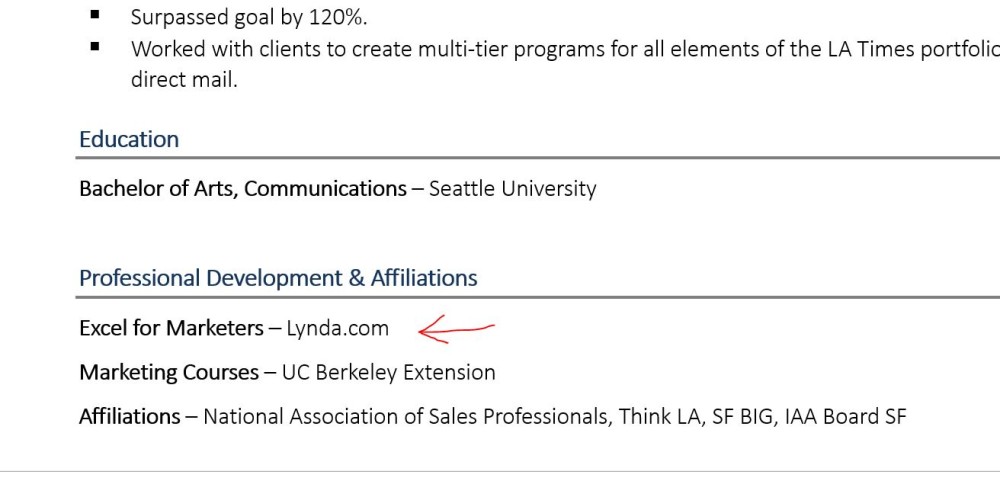How to List Online Courses on a Resume (Examples and Tips)

8 min read

If you’re one of the millions of people who pursue continuing education through online courses – congratulations! In an ever-evolving economy where new technology can quickly render old skills obsolete, it’s vital for employees to continually upgrade their skills. In addition, employers appreciate workers who are invested in their own skill sets. However, those online courses and certifications may pose a challenge for your resume if you decide to seek a new job. In this post, we will explain how to list online courses on a resume the right way.
What are online courses?
The term online courses typically refers to MOOCs. MOOCs, or Massive Open Online Courses, are the leading source of non-academia education and professional development. You’ve probably heard of some of the more popular MOOC websites, like Lynda, Udemy, and Coursera. But there are actually hundreds more!
When you browse MOOCs, you will be inundated with so many options for ways to develop professionally. The courses, though delivered through the sites listed above, are actually designed by leading global companies and ivy league colleges. There are short- and long-term professional certification courses, online Master's degrees, and in-depth skill development courses.
The true benefit of MOOCs though? They’re open-source. Meaning the content is free to access, and the certifications are still professionally verified. If you want to advance your career but don’t have the means or time to go back to school for a degree, online courses through MOOCs are excellent to know about.
Here are some of the other popular online services that offer courses:
Lynda
Coursera
Udemy
Udacity
Khan Academy
Codecademy
Should you List Online Courses on a Resume?
You might be wondering whether you should list online courses on your resume. Does it add value – or is it even worth listing online courses on your resume? Or any online studies, for that matter?
The answer is – Yes!
The world is changing – faster than most of us realize. Today’s skills often have a short shelf-life, and smart employees will recognize the need to upgrade their talents. That’s the best way to ensure that you maintain and enhance your value as an employee. In the end, that value is what makes employers want to hire you.
Of course, most of us would struggle to hold down a job and go to a traditional college at the same time. Fortunately, the rise of the internet has presented workers with alternative options for continuing education.
Why is it important to show online courses on a resume?
Any way that you are able to showcase professional development on a resume is encouraged. For many people, their careers don’t inherently follow a linear path, which can make a resume appear less strong. However, if you have a section in your resume to describe professional development, you can list out your online courses, adding value.
Online courses are appreciated by recruiters because usually for someone to enroll, it means they have an authentic desire to grow professionally. It also shows an affinity for keeping up with market and industry trends.
For example, the field of UX design has become very popular recently. In that time, the ethics and standards have also changed significantly. If someone entered UX in the early 2000s and has kept the same job, a recruiter might question the relevance of their insight. If that same candidate also showed professional development courses throughout the last twenty years, it would indicate that they are up to date with trends and have likely obtained the skills to produce appropriate content.
How to List Online Courses on Your Resume
MOOCs, including sites like Lynda, Udemy, and Coursera, offer workers valuable education, new or enhanced skills, and certifications that can carry real value in the marketplace. More importantly, employers need to be able to see how you’ve tried to keep pace with skillset changes. For all those reasons, you need to know how to list online courses on your resume.
Keep in mind that online courses are a recent phenomenon. That means that some employers may not understand their relevance – or even give them much credence. If you know how to list online courses on your resume, however, you can overcome those challenges.
These tips can help.
Choose Relevant Coursework
First, it’s important to be selective when you list online courses on your resume. You may include continuing education courses on a resume, but that doesn’t mean that the employer needs to hear about every class you take.
Instead, think about the skills you need for the job you’re seeking. Which courses provided skills that directly relate to that job? Those are the courses that you want to emphasize in your resume. Try to tailor your list as much as possible, for maximum impact.
Don’t Include Any Courses That Could Be Considered “Beginning-Level”
Skip any courses that might present you as a novice in that skill area. So, if you took a course introducing students to PowerPoint, for example, you can leave it off your resume. Its inclusion would mark you as a beginner and detract from your other areas of expertise. In short, only include courses that enhance your credibility as an expert in your field.
Some other beginner-level certs that might be most effective when omitted are the use of Microsoft Word, the Google Suite, or how to organize files on your computer. Your resume should be reserved for your proudest achievements. A recruiter might get the wrong idea about you if you consider using Word as a proud achievement.
Use online courses to advance your career
If you are interested in changing careers or pursuing a promotion at work, use online courses to your advantage! One of the biggest setbacks professionals face when trying to make a big career change is that a lot of the time, they don’t quite have the experience or meet the qualifications. Online courses can offset that.
Perhaps you don’t have five years of data analysis experience on top of your project management job. But, if you took an inline certification course in professional data analysis, you could still come out as a top candidate.
Choose Your Placement Wisely
Be smart about where you list online courses on your resume. Sure, they’re educational in nature, but that doesn’t mean that they belong in the education section of your resume.
Formal education is just that: formal. That includes university degrees and other college or trade school accomplishments. List those achievements in your education section, and then create a different section for your continuing education efforts.
We recommend using a title like "Professional Development", "Certifications", or "Professional Training" (or something similar) to highlight these online courses and skills.
(We wrote a good post on including certifications on your resume.)
You can use that section to list online courses on your resume, as well as other professional development. Try to limit those courses and skills to no more than five or six. You can include everything from online courses to technical certifications in this section.
Depending on the relevance of these courses to the job you’re applying for, you can choose to include the section on either the front page near the top, or towards the bottom.
Example of Online Courses on a Resume
Education
Bachelor of Arts, Communications – Seattle University
Professional Development & Affiliations
Excel for Marketers – Lynda.com
Marketing Courses – UC Berkeley Extension
Affiliations – National Association of Sales Professionals, Think LA, SF BIG, IAA Board SF
Here is an example on a resume:

Focus on How You’ve Used Those Skills
How you list online courses on your resume matters too. While you might be tempted to just use a dry list of your certifications and other continuing education, don’t. Those skill enhancements are basically meaningless without context. In other words, you need to do more than just list them; you need to showcase their value.
The best way to do that is to cite projects or tasks where you have used those skills. So, for example, if you received software certification of some kind, include a project that involved that skill.
That helps to flesh out the coursework and demonstrate its value to any prospective employer. It might require a little more creativity and thought on your part, but the results will be well worth the added effort.
Closing Thoughts
When you know how to list online courses on a resume, you can enhance your image as an expert in your field. At the same time, you will also demonstrate a passion for your industry. Just remember to focus intently on showcasing value. That will help any potential employer to better understand why you’re the best candidate for the job!
Recommended reading:

Written by
Emma Elizabeth, Resume Writer, Emma Elizabeth, Resume Writer
Emma is a certified employment specialist with over 6 years of experience in career mentorship and employment training. With an affinity for technical writing, Emma is passionate about developing training, policy, and procedure manuals. In 2020 she helped design Colorado’s first state-certified training program for people with disabilities entering the workforce.
